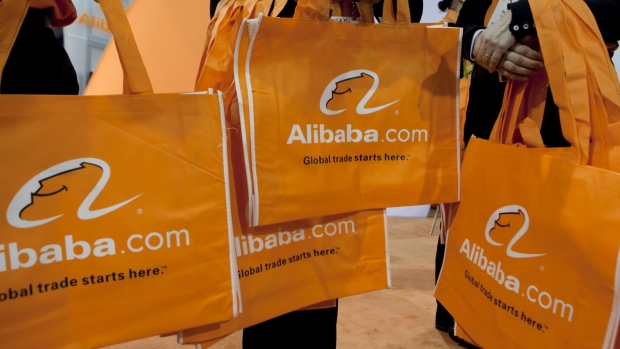Dec 15, 2022
Chinese Stock Delisting Threat Eases as US Gets Access to Audit Data
, Bloomberg News

(Bloomberg) -- US officials said they gained sufficient access to audit documents on companies in China and Hong Kong for the first time, a breakthrough that removes the acute threat of delisting for about 200 companies on New York exchanges.
The US Public Company Accounting Oversight Board said on Thursday that its inspectors have been able to sufficiently review audit documents from firms based in the two jurisdictions, after a decades-long standoff on the issue between Washington and Beijing.
The determination diminishes the chances that companies including Alibaba Group Holding Ltd. and JD.com Inc. will be delisted in the US, though the PCAOB must be able to fully inspect audit work papers for at least three consecutive years before the companies’ American Depositary Receipts will be in the clear.
Beijing’s willingness to make concessions on audits shows that China and the US can still work together on some tricky issues even as they clash on everything from semiconductors to national security and human rights. President Xi Jinping’s administration faces pressure to avoid unnecessary disruptions to China’s corporate sector at a time when the economy is struggling and the country is navigating a turbulent exit from its zero-tolerance strategy toward Covid.
“It’s a great first step and an important victory and very significant to show that there are areas where the US and China can have meaningful dialog in an otherwise very tense environment,” said Sandra Hanna, who leads the securities enforcement practice for Miller & Chevalier. “We need to continue to have a long-term view and monitor progress closely.”
Read more: Golden Dragons Dodge Threat of Delistings for Now
The China Securities Regulatory Commission said in a statement it welcomed the PCAOB’s decision and will continue to promote audit supervision cooperation with US. China and Hong Kong are the only places that historically haven’t allowed the reviews, with officials citing national-security and confidentiality concerns.
“Today’s announcement is about one question and one question only: is the PCAOB able to inspect and investigate firms in mainland China and Hong Kong completely at this time. The answer, following thorough and systematic testing, is yes,” PCAOB Chair Erica Williams told reporters. The agency would re-assess if access ebbed, she added.
Shares of US-listed China stocks initially jumped across the board on the news, pushing the Nasdaq Golden Dragon Index up as much as 2.5% just after the open on Thursday. Large-cap tech companies Alibaba and JD.com rallied as much as 3.5% each, while Pinduoduo Inc. rose 3.1%, before they erased gains to track a broad market slump.
The Golden Dragon Index closed 2.3% lower, while the Nasdaq 100 Index fell 3.4%. Bloomberg News had reported in November that US officials completed their first on-site inspection round in Hong Kong ahead of schedule.
The PCAOB said in a report that its inspectors and investigators were able to view full audit work papers of eight companies audited by KPMG Huazhen LLP in mainland China and PricewaterhouseCoopers in Hong Kong, and retain the information that they needed. The board will release a report on its inspections of each auditing firm in the first half of 2023, Williams said.
The individual companies whose audits were inspected won’t be identified in the reports. PCAOB inspections serve as an audit of the auditor, ensuring they meet basic standards and provide an effective check on corporate accounting.
Hong Kong
The agency’s 32 staff sent to Hong Kong found myriad potential deficiencies, but Williams said that the type of lapses and their number are typical for jurisdictions that have never been scrutinized by the PCAOB before. “We look at this as a sign really that our inspection process worked,” she said.
Williams told Bloomberg News that the agency has five ongoing investigations stemming from its work in China. Three were begun before PCAOB staff landed in Hong Kong in September, and two were initiated afterward, she said. “We try to move our investigations as as quickly as we can,” Williams said, adding that “enforcement is one of the best ways that we keep investors protected.”
The PCAOB said in its report that it “has not observed any instances of non-compliance” by the Chinese government with the terms of the inspection agreement between the two countries.
“This is the beginning — not the end — of our work to inspect and investigate completely,” Williams said in an interview Thursday with “Bloomberg Markets: The Close.”
“We already are making plans to have teams on the ground in 2023 in order to continue our regular inspections there,” she said. “And if China denies our access, if there are any impediments that they put in our way, we will not hesitate to make a determination immediately next year.”
The clash over audits became a political sticking point after the 2020 Holding Foreign Companies Accountable Act (HFCAA) said clients of firms whose work papers can’t be inspected face being kicked off the New York Stock Exchange and Nasdaq. The legislation set a three-year time frame for delisting companies. The board’s vote Thursday vacates a 2021 determination that China did not grant access that year, triggering the compliance countdown.
In a separate statement, Securities and Exchange Commission Chair Gary Gensler said the new determination “resets the three-year clock for compliance.”
Nevertheless, Chinese companies in the US face heightened disclosure requirements to inform investors of the risks associated with their corporate structure and their ability to pay investor dividends, Gensler said.
--With assistance from Matt Turner.
(Adds context from first paragraph and CSRC statement in sixth paragraph.)
©2022 Bloomberg L.P.





